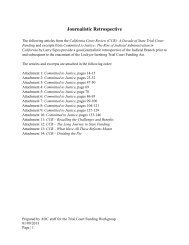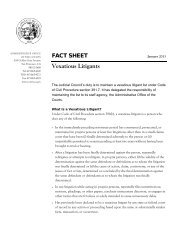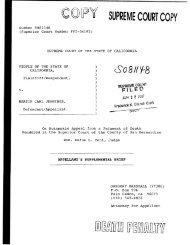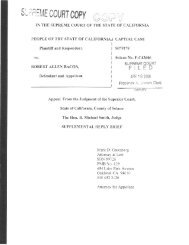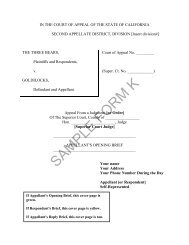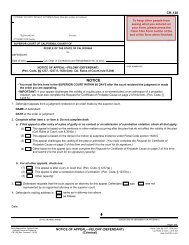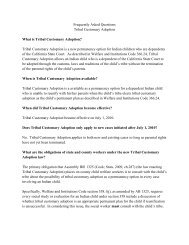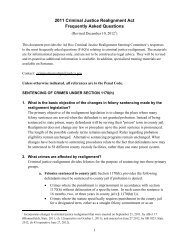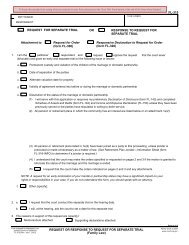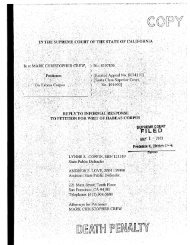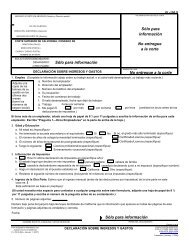Appellant, William Satele, Reply Brief - California Courts - State of ...
Appellant, William Satele, Reply Brief - California Courts - State of ...
Appellant, William Satele, Reply Brief - California Courts - State of ...
You also want an ePaper? Increase the reach of your titles
YUMPU automatically turns print PDFs into web optimized ePapers that Google loves.
F. <strong>Appellant</strong>s Have Not Forfeited The Constitutional Aspects OfThis Issue.<br />
Respondent contends that appellant forfeited the Fifth and Eighth<br />
Amendment aspects <strong>of</strong> this claim because <strong>of</strong> his failure to argue these aspects <strong>of</strong><br />
the issue below. (RB at p. 105.) This court should reject the contention that these<br />
claims are waived for several reasons.<br />
Respondent relies on People v. Lewis (2008) 43 Cal.4th 415, 490 fn. 19,<br />
People v. Wilson (2008) 43 Cal.4th 1, 13-14 fn.3, People v. Thornton (2007) 41<br />
Cal.4th 391, 462-463, and; People v. Lewis and Oliver (2006) 39 Cal.4th 970,<br />
1008 fn. 8.) However, these cases do not support respondent's position that<br />
appellant's claims are forfeited. In these cases, as appellant will explain more<br />
fully below, this court has considered and ruled upon a defendant's federal claims<br />
when the facts are undisputed and the legal analysis is similar to the analysis in<br />
which the court must engage in any case (People v. Lewis; People v. Wilson, infra)<br />
and when the appellate claim is <strong>of</strong> the kind that requires no trial court action to<br />
preserve it. (People v. Wilson; People v. Boyer (2006) 38 Cal.4th 412, 441 fn. 17,<br />
infra. ) This court has also considered and ruled upon a defendant's federal claim<br />
when the question as to whether the defendant has preserved his claim by trial<br />
court action is close and difficult because <strong>of</strong> ambiguity in the law (People v.<br />
Lewis, infra). And, in People v. Thornton, infra, this court considered and ruled<br />
upon the merits <strong>of</strong> a defendant's claim even after determining the claims have<br />
been forfeited.<br />
Thus, in People v. Lewis, the Attorney General claimed that a defendant's<br />
state constitutional challenge against the seating <strong>of</strong> a prospective juror had been<br />
waived by a failure to object at trial. This court ruled the claim was not forfeited<br />
because the defendant's state constitutional claim was based on the same facts<br />
underlying the federal claim and required a legal analysis similar to that required<br />
by the federal claim. (People v. Lewis, supra, 43 Cal.4th at p. 490 fn. 19; citing<br />
People v. <strong>William</strong>s (1997) 16 Cal.4th 635, 666-667 (federal Due Process Clause<br />
requires sentencing jury to be impartial to same extent that Sixth Amendment<br />
21



